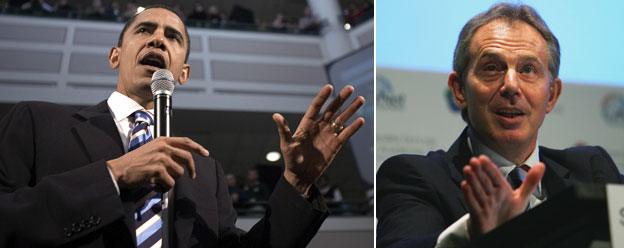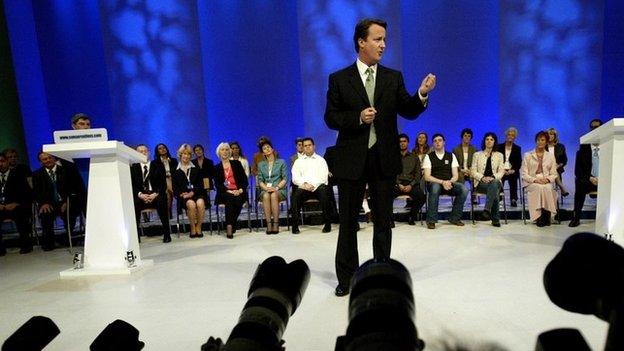Why do politicians speak the way they do?
- Published

Election mania is just around the corner, with politicians making their pitches for the public's votes. What are the techniques they use to try and snare people's attention, asks David Stenhouse.
Rhyme and Repeat
"If you don't want the time, don't do the crime," the-then Home Secretary Michael Howard told the Tory Party conference in 1995. As poetry goes, it was hardly John Keats, but it did reveal one of the first rules of political speechmaking - a rhyme can get your message over. And if you can't rhyme, then repeat.
The address Dr Martin Luther King delivered on the steps of the Lincoln Memorial on 28 August 1963 is known as the I Have a Dream speech for a good reason - he repeated the phrase over and over.
Barack Obama repeated the phrase "Yes we can" until it became a rally call for his 2008 election campaign. And Tony Blair hammered home New Labour's policy position in a famously-repeated phrase: "Education, education, education."
Reframe and rename
Frank Luntz, the American political consultant and pollster, has changed the debate in US politics by encouraging politicians to change their language. "Estate taxes" became "death taxes," a phrase which stoked voter resentment. "Oil drilling" became "energy exploration". "Citizens" became "hard-working tax payers".
British voters witnessed the power of reframing and renaming in the 1990s when the "community charge" was rebranded by opponents as the hated "poll tax."
Swotting up
Natalie Bennett questioned over Green Party spending plans
How Natalie Bennett, the Green Party leader, must have regretted not staying up the night before with her party's manifesto and a recycled torchlight after she was grilled by Andrew Neil on the BBC's Sunday Politics.
Neil, who questioned Bennett on the costs of her own party's spending commitments, revealed one of the key perils facing politicians - they are going to be questioned extremely closely on the detail of their proposals.
Apologise, if necessary
When London Mayor Boris Johnson was pressed by the BBC's Eddie Mair to admit that he had ambitions to become prime minister, he yelped: "Permission to obfuscate."
Nick Clegg spoofed in 'sorry' music video
When politicians are pinned in the corner, it is always wise for them to have a escape route/ But why don't they just behave like normal human beings and say "sorry?"
One answer is that it opens them up to ridicule. When Lib Dem leader Nick Clegg made a party election broadcast apologising for his party's abandoned pledge on tuition fees it was remastered, turned into a comic song, and became a huge hit on social media. He must have wondered why he bothered.
Wander about

In 2005, David Cameron won the Tory party leadership after a speech in which he stepped away from the lectern and wandered around the stage, speaking without notes. It was a way of looking modern, unencumbered by fussy props, and he connected with his audience so successfully that they voted for him instead of his rival David Davis.
Ed Miliband describes being mistaken for Benedict Cumberbatch
Ed Miliband's speech to the 2014 Labour Party conference was a different example of wandering about. In it, Miliband described the people he met as he toured the country, using a new innovation which attempts to show politicians are in touch with the electorate. Two girls on Hampstead Heath said "no offence" but they had been hoping for Benedict Cumberbatch. Others told him about their financial woes. But the speech misfired, especially after it became apparent that he had forgotten to mention the deficit. If you are going to do without the teleprompter, make sure you remember what you are trying to say.
Listen to: Jonathan Powell Read My Lips: Why Politicians Speak the Way They Do on BBC Radio 4 at 20.00 GMT on 14 February.